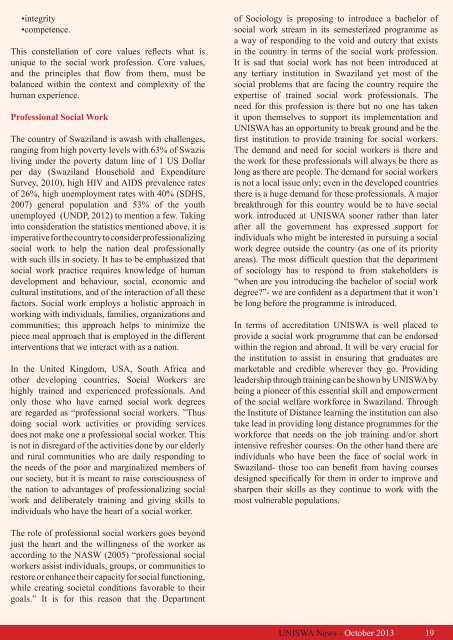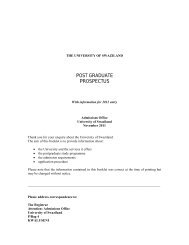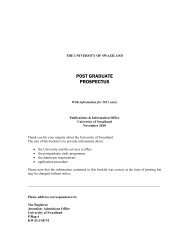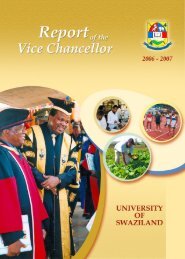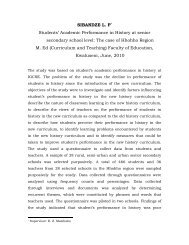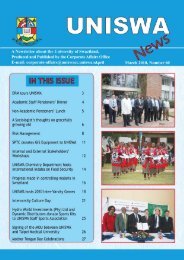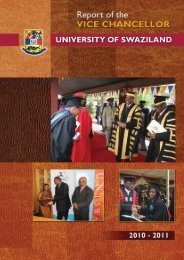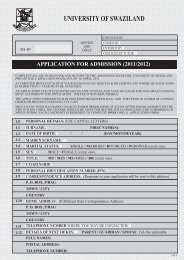UNISWA
October 2013 - University of Swaziland
October 2013 - University of Swaziland
- No tags were found...
You also want an ePaper? Increase the reach of your titles
YUMPU automatically turns print PDFs into web optimized ePapers that Google loves.
•integrity•competence.This constellation of core values reflects what isunique to the social work profession. Core values,and the principles that flow from them, must bebalanced within the context and complexity of thehuman experience.Professional Social WorkThe country of Swaziland is awash with challenges,ranging from high poverty levels with 63% of Swazisliving under the poverty datum line of 1 US Dollarper day (Swaziland Household and ExpenditureSurvey, 2010), high HIV and AIDS prevalence ratesof 26%, high unemployment rates with 40% (SDHS,2007) general population and 53% of the youthunemployed (UNDP, 2012) to mention a few. Takinginto consideration the statistics mentioned above, it isimperative for the country to consider professionalizingsocial work to help the nation deal professionallywith such ills in society. It has to be emphasized thatsocial work practice requires knowledge of humandevelopment and behaviour, social, economic andcultural institutions, and of the interaction of all thesefactors. Social work employs a holistic approach inworking with individuals, families, organizations andcommunities; this approach helps to minimize thepiece meal approach that is employed in the differentinterventions that we interact with as a nation.In the United Kingdom, USA, South Africa andother developing countries, Social Workers arehighly trained and experienced professionals. Andonly those who have earned social work degreesare regarded as “professional social workers. ”Thusdoing social work activities or providing servicesdoes not make one a professional social worker. Thisis not in disregard of the activities done by our elderlyand rural communities who are daily responding tothe needs of the poor and marginalized members ofour society, but it is meant to raise consciousness ofthe nation to advantages of professionalizing socialwork and deliberately training and giving skills toindividuals who have the heart of a social worker.of Sociology is proposing to introduce a bachelor ofsocial work stream in its semesterized programme asa way of responding to the void and outcry that existsin the country in terms of the social work profession.It is sad that social work has not been introduced atany tertiary institution in Swaziland yet most of thesocial problems that are facing the country require theexpertise of trained social work professionals. Theneed for this profession is there but no one has takenit upon themselves to support its implementation and<strong>UNISWA</strong> has an opportunity to break ground and be thefirst institution to provide training for social workers.The demand and need for social workers is there andthe work for these professionals will always be there aslong as there are people. The demand for social workersis not a local issue only; even in the developed countriesthere is a huge demand for these professionals. A majorbreakthrough for this country would be to have socialwork introduced at <strong>UNISWA</strong> sooner rather than laterafter all the government has expressed support forindividuals who might be interested in pursuing a socialwork degree outside the country (as one of its priorityareas). The most difficult question that the departmentof sociology has to respond to from stakeholders is“when are you introducing the bachelor of social workdegree?”- we are confident as a department that it won’tbe long before the programme is introduced.In terms of accreditation <strong>UNISWA</strong> is well placed toprovide a social work programme that can be endorsedwithin the region and abroad. It will be very crucial forthe institution to assist in ensuring that graduates aremarketable and credible wherever they go. Providingleadership through training can be shown by <strong>UNISWA</strong> bybeing a pioneer of this essential skill and empowermentof the social welfare workforce in Swaziland. Throughthe Institute of Distance learning the institution can alsotake lead in providing long distance programmes for theworkforce that needs on the job training and/or shortintensive refresher courses. On the other hand there areindividuals who have been the face of social work inSwaziland- those too can benefit from having coursesdesigned specifically for them in order to improve andsharpen their skills as they continue to work with themost vulnerable populations.The role of professional social workers goes beyondjust the heart and the willingness of the worker asaccording to the NASW (2005) “professional socialworkers assist individuals, groups, or communities torestore or enhance their capacity for social functioning,while creating societal conditions favorable to theirgoals.” It is for this reason that the Department<strong>UNISWA</strong> News - October 2013 19


